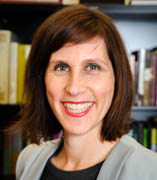
Rachel Havrelock, Ph.D.
Associate Professor
English
Contact
Building & Room:
UH 1909
Email:
Related Sites:
About
Rachel Havrelock is the founder and director of the UIC Freshwater Lab, a humanities-based initiative focused on research, teaching, and public awareness about the Great Lakes. The Freshwater Lab sponsors summits that bring researchers, elected officials, and water professionals together for transformative dialogue; offers courses and training that treat the lakefront and its communities as living labs; and fosters connections between leaders from the Great Lakes and other watersheds through water diplomacy. The Lab’s Freshwater Stories digital storytelling site makes the latest research on Lake Michigan available and actionable for the general public. The Freshwater Lab’s latest project traces the path of Chicago’s wastewater from Lake Michigan to the Gulf of Mexico. In addition to telling the story of this wastewater and its impacts, Havrelock has initiated a policy study concerning water reclamation and nutrient recovery.
Rachel’s concentration on the local watershed follows two decades of work in the Middle East. She is the author of River Jordan: The Mythology of a Dividing Line (University of Chicago Press) and articles on water, oil, and Middle East politics in Theory and Criticism, South Atlantic Quarterly, National Identities, Foreign Affairs, and several edited volumes. She is a member of the Cambridge University Middle East Water and Boundaries research group (2015-20) and a member of the Ecopeace Middle East International Advisory Council. Havrelock served as a U.S. Department of State Professional Fellow on Middle East water issues, achieving a 2014 Alumni Impact Award from the State Department.
As they are in society at large, water and oil are intertwined in Rachel’s research. She is working on a book about the world’s first transnational oil pipeline that once spanned from Kirkuk to Haifa. She jointly authored After Oil (University of Alberta, 2016) with the Petrocultures Research Group. The Fossil Fuel page on Freshwater Stories demonstrates an additional interest in the Tar Sands pipelines that surround and bisect the Great Lakes. These interests in water and oil as social and political forces are matched with inquiry into how they are represented and rendered in literature and other forms of communication.
Havrelock is also active in the field of biblical literature. She is completing a book manuscript entitled The Joshua Generation: Conquest and the Promised Land about the influence of the biblical book of Joshua on the modern State of Israel. Her articles on biblical literature have appeared in The Bible and Critical Theory, Critical Research in Religion, Biblical Interpretation, the Journal of Biblical Literature, The Bible and Feminism: Remapping the Field, The Oxford Handbook to the Reception History of the Bible, and the Oxford Encyclopedia of the Bible and Gender Studies for which she also served as the Early Judaism editor.
Always in search of new media outlets for her research, Rachel is an active columnist and op-ed writer, a playwright, and television guest/host on the History Channel’s Mysteries of the Bible and Discovery Channel’s series, Who Was Jesus? Her work has been supported by the Humanities Without Walls Consortium, the Charles Steward Mott Foundation, the McDougal Family Foundation, the UIC Institute for the Humanities, Centre for Research in the Arts, Social Sciences and Humanities (CRASSH) at the University of Cambridge.
Selected Publications
River Jordan: The Mythology of a Dividing Line (Chicago: University of Chicago Press, 2011).
Op-ed, “Rust Belt no more: Chicago should be capital of the Water Belt, Chicago Tribune, February 8, 2018.
“The Borders Beneath: On Pipelines and Resource Sovereignty,” South Atlantic Quarterly 116.2 (2017): 408-416.
“Pipelines in the Sand: The Middle East after Sykes-Picot,” Foreign Affairs, May 17, 2016.
“The Ancient Past that Oil Built,”The Bible and Critical Theory11:2 (2015): 51-60.
“The Joshua Generation: Conquest and the Promised Land,” Critical Research in Religion1:3 (2013): 308-326.